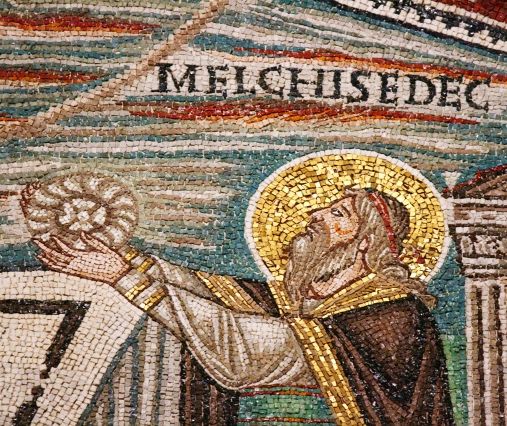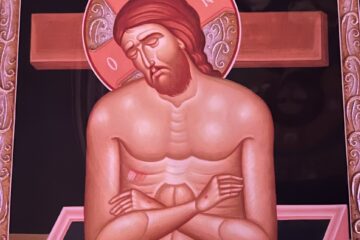Initiating Your disciples, O Lord, You instructed them, saying, “O my friends, see that no fear separates you from Me. Although I suffer, yet I do so for the sake of the world. So do not fall away because of Me; for I came not to be served but to serve, and to give My life as a ransom for the world. So, if you are My friends, imitate Me. Whoever would be first, let him be last; let the master be like the servant. Abide in me, so that you may bear fruit; for I am the Vine of life.”
~Aposticha, Nyptiras Service, Holy Wednesday Evening, Trans. by Fr. Seraphim Dedes
—
“I am the true vine, and My Father is the vinedresser. Every branch of Mine that bears no fruit, He takes away, and every branch that does bear fruit He prunes, that it may bear more fruit. You are already made clean by the word which I have spoken to you. Abide in Me, and I in you. As the branch cannot bear fruit by itself, unless it abides in the vine, neither can you, unless you abide in Me. I am the vine, you are the branches. He who abides in Me, and I in him, he it is that bears much fruit, for apart from Me you can do nothing. If a man does not abide in Me, he is cast forth as a branch and withers; and the branches are gathered, thrown into the fire and burned. If you abide in Me, and My words abide in you, ask whatever you will, and it shall be done for you.
John 15:1-7
If there were ever to be a revision of Holy Week hymns, I would make two specific changes. I would cut down drastically on the number of hymns about Judas. And I would add hymns about the “farewell discourses” (John 13-17) that comprise the First Gospel on Holy Thursday evening. The hymns of Holy Thursday evening seem almost “dominated” by Judas and with so much Scripture to work from, especially in the first Gospel reading, it seems like so much more could be done.
The hymn we are discussing in this reflection relates to the first Gospel of Holy Thursday evening, even though it is sung on Holy Wednesday evening. As we discussed previously, this farewell address of Jesus in the Gospel of John was given at the table in the upper room at the last supper. It was only after this was completed that the disciples went to the Garden of Gethsemane.
In these final instructions, Jesus was setting the foundation for Christianity. We have already discussed that Jesus washed the feet of the disciples, indicating that they were to serve and not be served, that the greatest should be considered the least, and that they should lead with humility. The above hymn reveals additional instructions. First, Jesus calls the disciples “friends.” We read in John 15:15, that He says “No longer do I call you servants, for the servant, does not know what his master is doing; but I have called you friends, for all that I have heard from My Father I have made known to you.” Thus, we are to see Jesus not only as Lord, but a friend, and we are to feel comfortable with Him as we do with a friend, we are to confide in Him as we do in a friend. And He will be loyal to us, as friends are with each other.
It’s amazing how hymns can draw from several passages of Scripture. Where the hymn says “see that no fear separates you from Me,” it evokes Romans 8:38-39, where St. Paul writes “For I am sure that neither death, nor life, nor angels, nor principalities, nor things present, nor things to come, nor powers, nor height, nor depth, nor anything else in all creation, will be able to separate us from the love of God in Christ Jesus our Lord.” Fear cannot separate us either.
Jesus warns the disciples that His death should not be a cause of fear and sadness, that His suffering is voluntary and necessary. It was His intention to give His life as a ransom for the sins of the world.
Finally, He tells us to abide in Him, so that we may bear fruit. This sentence of the hymn is taken from John 15:1-7, where Jesus tells us that He is the vine and we are the branches. If a branch is cut away from the vine, it dies quickly. It has no life if it is not connected to the vine. The hymn reveals Jesus as the “Vine of Life.” When we cling to Him, this is where we draw our “life”—our purpose, our identity, and our strength. To “abide” means to cling to, or hold fast to. We are to cling to God, to become one with Him, to take comfort, guidance, and protection from Him. This happens in prayer, in studying Scripture, in worship, in following the commandments of loving God and serving others, and most especially we abide in Christ when we receive Him in the Holy Eucharist. To abide with Him in this life sets the foundation for abiding with Him for eternal life. When we abide in Him, we also bear spiritual fruit which leads others to abide in Him.
He, whom Isaiah proclaimed to be the Lamb, comes to His voluntary slaughter. He gives His back to whips and His cheeks to blows. He turns not away His face form the shame of spitting. He is sentenced to a shameful death. The sinless One willingly accepts it all, so that He might grant to all the resurrection from the dead. (Doxastikon, from the Praises, Nyptiras Service, Holy Wednesday Evening, Trans. by Fr. Seraphim Dedes)
Abide in the Lord through prayer, Scripture reading, worship, service and the Eucharist!


0 Comments